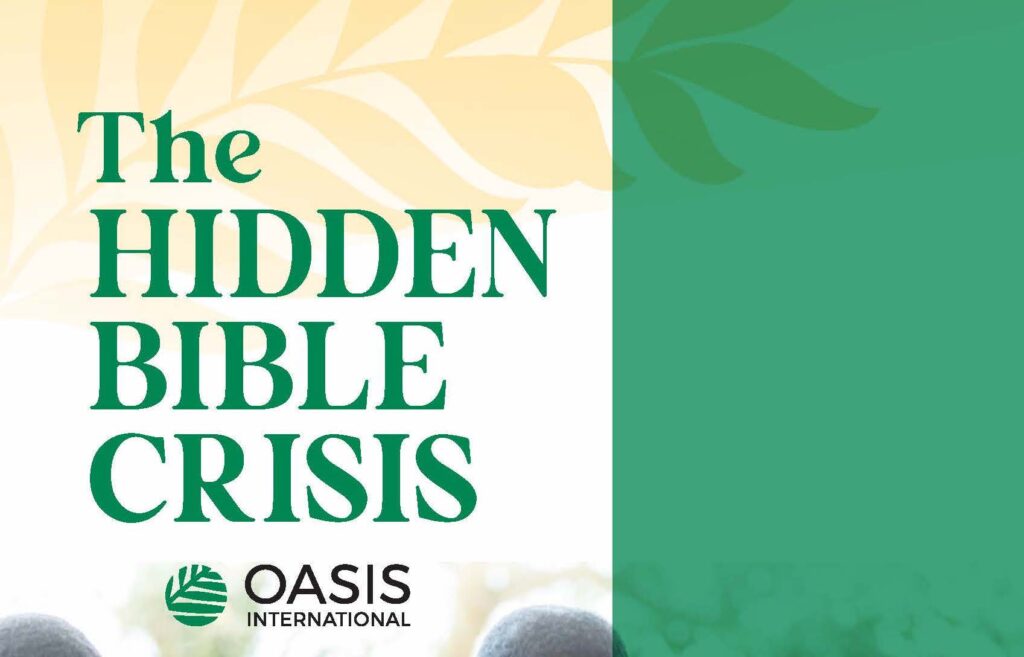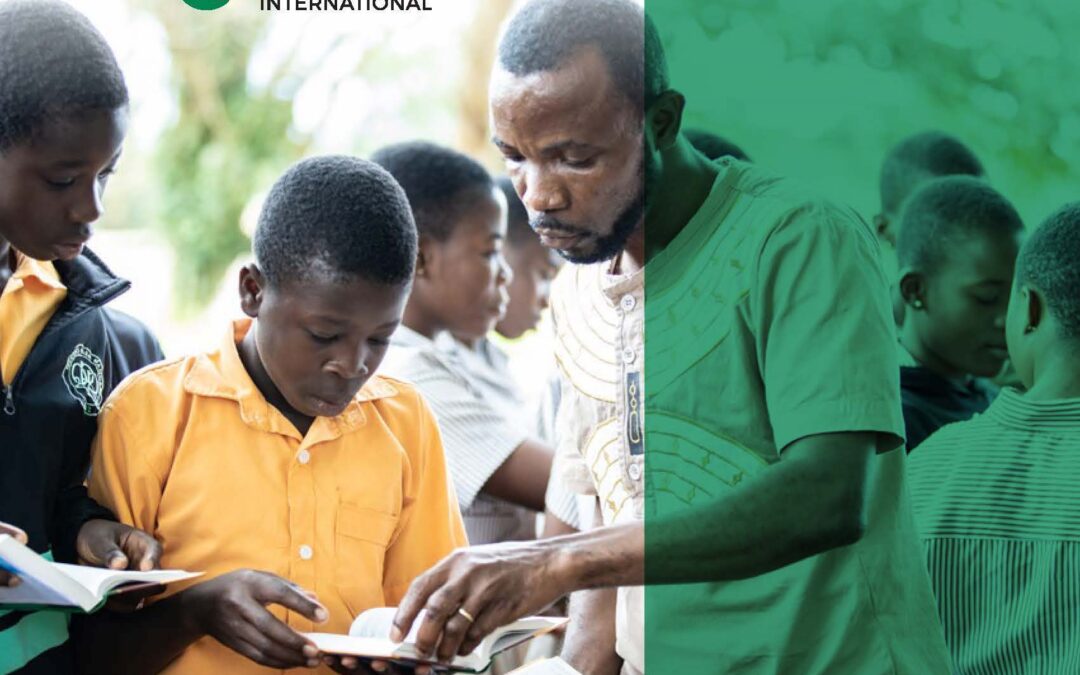Growing up in evangelical church, you hear a lot about missions, other cultures, and other languages. You hear amazing testimonies about reaching new people groups in remote areas — wonderful. But as I have traveled throughout Africa for almost 30 years now, a different reality is emerging. There is a move toward major languages of education in Africa — this has only accelerated with the internet, smart phones, and greater access to TV from the West. Many grandkids in Africa are being educated in English, French, or Portuguese and no longer fluent in the original language of their grandparents; I see it time and time again.
Out of this understanding grew this Oasis philosophy: a calling to grow discipleship. It is interesting, I will speak about the discipleship crisis for those who speak and read in English, French, and Portuguese, even show a map of Africa that shows the major languages of education across the continent, and yet inevitably someone will come up afterwards and say, “so you translate the Bible for Africa? For what languages? I had an uncle who worked in….” I realize that the message of translation is needed for the Bible, yet it is so embedded in our minds as the only need that it is hard for us to understand the new realities of Africa — education, national communication, and commerce are happening for many in these three major languages and these believers don’t have to tools they need to deepen their faith.
How do we start looking forward to today’s and tomorrow’s emerging needs? Out of these experiences came my thoughts and writings on a “Hidden Bible Crisis” — it is an attempt to connect people with this new reality Africa is facing. The Oasis team has done a great job refining my first writings and thoughts on the topic in the article below. Enjoy!

At Oasis, we have a legacy of loving God’s Word. Our founder, Ed Elliott, dedicated himself to distributing Bibles and Christian books throughout Africa. His efforts have borne much gospel fruit, leaving us with big shoes to fill. We share Ed’s passion for the living and active Word, and believe that it has the power to change the life of every person in the world.
This is why we at Oasis have a broken heart for the two Bible crises in our world today – both of which are central for Africa’s future.
The first crisis is one you’re likely familiar with – the need to translate the Bible into languages where people have never had the opportunity to read God’s Word. The Great Commission cannot be completed without Bible translation. The need is immense – in Nigeria alone, 203 languages do not have a fully-translated Bible or New Testament that need one.
However, there is another Bible crisis, one that few American Christians know about. This hidden crisis is more unfamiliar and less understood – distributing Bibles to all people that need one. Across the world – and particularly across Africa – millions of people have given their lives to Jesus but do not have access to a Bible. Can you imagine trying to grow spiritually without a Bible? In some areas, even your pastor may not have a full Bible.
The statistics are sobering. According to our calculations, using the most optimistic figures, 15 million Bibles and Bible portions are distributed in Africa every year. Their often-substandard quality results in a shelf life of five to ten years. At this distribution rate, no more than 150 million Africans have Bibles today. Given the estimated 700+ million Christians in Africa, this leaves as many as 550 million Christians in Africa without a Bible. We are facing the largest Bible famine in world history.
While both the translation crisis and the distribution crisis are tragic and urgently need to be resolved, at Oasis, we believe that resolving the distribution crisis is our calling. Several organizations are spending many millions of dollars to solve the translation crisis, while very few organizations are spending even a few million dollars to intentionally solve the distribution crisis. Perhaps an illustration will help us understand why we may not need to translate Bibles into every language to reach everyone in Africa.
Imagine that you have thirty minutes to preach the gospel to a room of 100 people – each with a different mother tongue. It is impossible to reach everyone, so you spend your time speaking to each person in their primary language. Despite your best efforts, you do not have time to talk with more than five people. Though your work is praiseworthy and commendable, 95 people do not hear the gospel.
But what if these people shared a secondary language? You see, even though every person in the room comes from a different language background, the vast majority of the people are fluent in a shared second language. Knowing this, you can use your time to speak to the crowd in this common language! You could impact almost every single person with the gospel, not just a handful. Additionally, somebody from the shared second language almost certainly speaks the language of anyone that cannot understand and can relay your message to them.
This is the situation of African Christianity. There are millions of people in Africa, speaking hundreds of heart languages that do not yet have a copy of the Bible. Every last person needs a copy of the Bible in a language they can understand. But according to Wycliffe statistics, the Bible has already been translated for the reading language of as many as 90% of Africans. While we should not rest until this number has reached 100%, there needs to be balance in our approach to how we resource Bible ministry.
Nearly every child below the Sahara Desert learns to read English, French or Portuguese in school. This means that most readers in Africa are literate in English, French or Portuguese – they oftentimes prefer reading in one of these languages over their mother tongue. For instance, even though the most popular Bible app in Nigeria has translations in 18 of the most-spoken Nigerian languages, 98.9% of reading hours by Nigerian users are in English. In Oasis’ recent research, 93% of over 2,000 church attendees in rural Nigerian areas preferred to read the Bible in English for their personal devotions – even when they went to church in another language!
For many Africans, the problem is not that they don’t have a Bible in their heart language, but that they don’t have a Bible in their reading language! Meeting the need for God’s Word by distributing English or French Bibles will reach many more Africans than the translation effort.
In short, if we want more people to read and be changed by the Bible, we should provide Bibles to them in the language that they can read. Tragically, very few organizations are concentrating on solving the Bible distribution crisis in Africa.
The need is pressing. In the last 20 years, 1,721,006,000 total Bibles were printed around the world. However, only 7.1% of those Bibles (122,688,000) were distributed to the African continent, which represents 26.5% of the global Christian population. In contrast, North America received 27.72% (477,082,000) of existing Bibles, despite representing just 11.64% of global Christianity.*
The problem is only getting larger. Very little is being spent to address the distribution crisis. In fact, some of the largest traditional Bible distribution agencies are pulling back from actual distribution of Bibles, leaving a great need in major languages. Additionally, Christianity in Africa is growing like never before. Today over 1 in 4 Christians live in Africa. By 2060, 40% of the world’s Christians will be African. Africa is now the center of global Christianity, shining the light of Christ to a Western world that has largely forsaken God. The best way to ensure that Africa’s witness will be deeply rooted in the truth of God’s Word is to ensure that as the number of Christians grows, the number of Bibles also grows.
Someone in North American may think there is an easy answer: send more Bibles! However, that is the wrong way to address the distribution crisis. While it may seem helpful, this solution is like putting a Band-Aid on a wound. It puts local bookstores out of business, destroys existing distribution infrastructure, and will create an even worse crisis when the money runs out. The problem is systemic and must be met with a wide-ranging solution – a solution where Africans buy the Bibles they need, and Africans make a living by selling the Bibles their fellow church members need.
Oasis is seeking to address Africa’s Bible distribution crisis in a sustainable way that creates jobs and empowers Africans. We partner with local bookstores, ministries, and denominations to lay a foundation so that Africa is provided with Bibles for years to come.
Oasis’ plans for market upheaval, disruption, and development rely on empowering local entrepreneurs and building scale. But we can’t do it alone. Like any growing venture, Oasis’ outreach can be accelerated with several significant investments over the next years. Investing in Bible distribution has the potential to touch many more millions of lives, radically enriching global Christianity.
This crisis will not be solved overnight. But by the grace of God, Oasis’ passion for God’s Word will lead to the distribution of readable, affordable Bibles throughout the continent. As the world changes, and Christianity becomes centered in the global South, a spiritually-rich, biblically-sound church in Africa can shine God’s light to the world like never before. Are you ready to join us?
*Notes from John, Todd M. and Gina A. Zurlo, eds. The World Christian Encyclopedia Third edition. Edinburgh, UK: Edinburgh University Press, 2020.
See the original article at https://oasisinternational.com/project/the-hidden-bible-crisis/.

